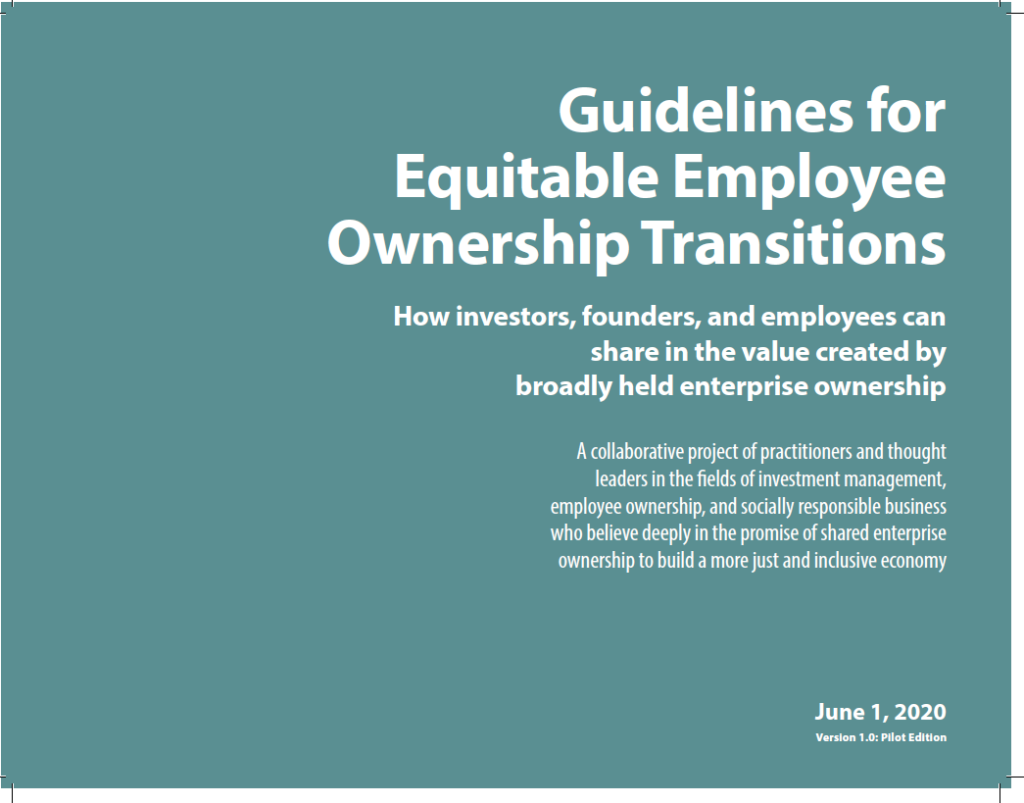New publication outlines best practices for investors, asset managers and others

by Karen Kahn
The novel coronavirus has permanently shuttered tens of thousands of businesses, leaving millions of employees jobless in a perilous economy. The pandemic has had a particularly devasting impact on Black- and Latinx-owned businesses, with one study estimating that the number of Black business owners has been reduced by 40 percent and Latinx, by 32 percent, since February 2020.

In traversing these turbulent waters, thousands of business owners will need to reassess their operations and finances and consider whether they can rebuild. To temper the crisis and build a more equitable and resilient economy in the process, impact investors—individual and institutional—are looking to take employee ownership to scale, a trend we wholeheartedly endorse at Fifty by Fifty. But we also recognize that an influx of capital, without proper guardrails, could go awry, further extracting wealth from communities rather than building widespread financial well-being.
An influx of capital, without proper guardrails, could go awry, further extracting wealth from communities rather than building widespread financial well-being.
It is in this context, that Jessica Rose, co-founder of Fifty by Fifty, and Hilary Irby, head of impact strategy at Soros Fund Management, announced the publication of Guidelines for Equitable Employee Ownership Transitions in Impact Alpha.
The Guidelines were developed in a fieldwide collaborative process led by the Democracy Collaborative, Soros Fund Management, and the Open Society Foundations, to ensure maximum social and economic benefits for workers and their communities in employee ownership transitions.
***********
Hear Jessica Rose talk with Impact Alpha about the role of impact investors in scaling employee ownership.
***********
In Impact Alpha, the Rose and Irby explain, “Employee buyouts can be opaque to newcomers. To help guide investors, asset managers, and professional advisors in structuring deals that maximize positive impact for employees, the guidelines identify five goals for employee ownership transactions”:
- Design equitable deal structures: Balance the interests of sellers, investors, and employee owners by setting a fair price and ensuring the deal is structured to sustain employee ownership for the long run. Importantly, this means ensuring investors don’t leave the firm over-leveraged with debt upon exit.
- Embed broad-based ownership and support employee participation: Create substantial—at least 30 percent—employee ownership and ensure it reaches throughout the organization, from executives to front-line employees. Then build a participatory culture by sharing information and supporting employees in developing financial and business skills.
- Promote quality jobs and working conditions: Improve job quality by ensuring that every employee earns a living wage, has access to meaningful benefits, works in a safe environment, and is supported to grow professionally.
- Consider prioritizing deals that impact marginalized communities and workers: Whenever possible, look for firms where employee ownership would benefit low-wage workers, people of color, women, immigrants, or others without meaningful access to good jobs or asset ownership.
- Measure and report on employee impact: Establish goals and metrics to measure outcomes for employees alongside company and investor performance—and then report progress to a wide group of stakeholders.
The Guidelines, which are housed at the Rutgers Curriculum Library for Employee Ownership, break these goals down into actions relevant to each deal stage: sourcing/selection, due diligence and valuation, deal structuring through closing, and post-transaction operations. This makes the document an important how-to guide for social investors, asset managers, foundations, family offices, and any other party helping to structure employee ownership transitions.
In their forward, the authors write that the Guidelines are offered “in prototype form, to the many investors, asset managers, and employee ownership professionals who lead and will lead this important work in the future.” The hope is for dealmakers and other stakeholders to “pilot test, innovate upon, and refine them,” building consensus around best practices in the effort to build a more equitable economy.
Karen Kahn is a communications consultant and the editor of Employee Ownership News.
To follow Employee Ownership News, subscribe to the Fifty by Fifty newsletter or follow us at Medium.
